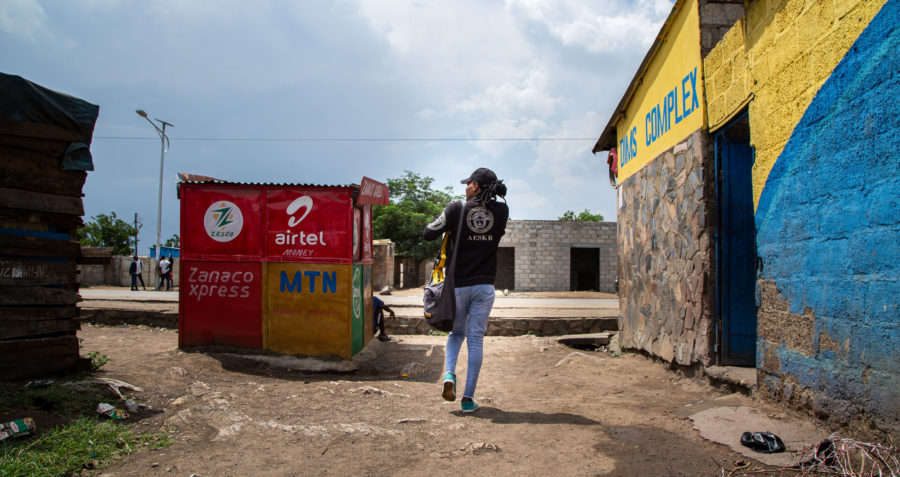How #BlackLivesMatter is reigniting my passion to ‘do development differently’
 Frontline AIDS / Tony Kawimbe / Arete 2020
Frontline AIDS / Tony Kawimbe / Arete 2020
Divya Bajpai, Director: Programmes at Frontline AIDS, gives her perspective on how the ongoing movement for racial equality could be transformative for organisations working in international development.
Is ‘decolonising development’ the new band wagon that the international development sector is jumping on? Or is it a genuine response to the Black Lives Matter movement and an attempt to challenge the post-colonial heritage and political and financial structures that underpin the ‘aid industry’?
As a woman of Indian heritage, who has worked in global health and development for more than 20 years, this is a current preoccupation for me. I am experiencing, along with other colleagues who are black and people of colour, a process of changing and deepening consciousness through deeply emotive conversations about our sector and our diverse experiences of life and work as a minority.
This preoccupation and critical thinking often makes me feel vulnerable and yet also gives me strength in my conviction that we must do something meaningful and authentic in our work. We must challenge the status quo and help shape a new way of doing development differently.
I started my career in global health and international development at Frontline AIDS (formerly the International HIV/AIDS Alliance) in 1998. In my post-graduate academic studies I was very critical of how ‘colour-blind’ the development sector can be. However, my experience during the early years of our organisation and the AIDS response was underpinned by the strong belief that solutions do not come from and are not imposed by a powerful global North. Individuals and local communities whose lives have been most impacted by HIV must lead and set the agenda for the AIDS response, supported by national civil society organisations.
The paradigm shifting power of this belief and approach has inspired me in my work for more than two decades, and in some ways moved my focus away from my earlier concerns about race.
Creating relationships of trust
I have spent the past 20 years trying to create relationships of trust and mutual respect with our partners, based in Asia, Africa and Latin America. I’ve worked with colleagues to help establish national civil society organisations, as well as country offices that transitioned to become powerful independent national civil society actors. I’ve supported national partners to host regional technical support hubs and become centres of HIV technical practice driving thought leadership from the global south.
I am now involved in the next step in Frontline AIDS’ journey towards co-creating a global civil society partnership where power and leadership is genuinely shared. This means being inclusive of cultural differences in ways of working and providing an equal space for all to have a voice, irrespective of an organisation’s size or geographical location.
Crucially, it will also mean power and leadership is not informed or mediated by financial flows of money from the ‘North’ to the ‘South’, which often reinforce the power hierarchies embedded within our work. This may lead to trade-offs, and where Frontline AIDS would conventionally have led a consortium of partner organisations to deliver an activity, this may not automatically be the case.
All this is possible and is beginning to happen because of Frontline AIDS’ longstanding relationships of trust, built on the highs and lows of collaborating to deliver development programmes with a strong sense of shared values and commitment to ending AIDS for everyone, everywhere.
Co-creating a new model of partnership
In 2019, Frontline AIDS embarked on a journey with partners to go to the next level, for the partnership to be more open and inclusive, based on the foundations of trust, joint action and solidarity built over the last 27 years. As a partnership, we are taking steps to co-create horizontal and multi-directional exchanges of knowledge and resources, with a diverse range of civil society actors irrespective of where they are based geographically.
In this process of co-creation with partners, a shared aspiration for the partnership must emerge among Frontline AIDS staff and international board of trustees. Sensitive conversations have taken place about what can potentially be lost as we move from a centralised model of a ‘secretariat’ being at the core of the partnership serving our partners, to one where all partners, including Frontline AIDS, are equal partners. Many questions have been and will continue to be asked, about the process of co-creating a new model of partnership, which includes a mechanism for shared oversight of the partnership. How will this appeal to the sector and our respective donors and boards?
Organisations in the partnership must also be prepared to have difficult conversations with each other. This is all part of the process of co-creation and a welcome part of the journey. With my fellow travellers at Frontline AIDS and partner organisations – I am filled with hope that we can take these brave steps together.
Tags
#BlackLivesMatter


